大学英语六级语法基础:时态(强烈推荐)
英语六级的常见语法知识点整理

英语六级的常见语法知识点整理英语语法在六级考试中扮演着重要的角色,掌握常见的语法知识点对于提高写作和阅读的能力至关重要。
下面是对英语六级的常见语法知识点进行整理,以帮助大家更好地备考。
1. 时态与语态时态和语态是英语语法的基础,正确的时态和语态使用可以使句子表达得更加准确。
常见的时态包括一般现在时、一般过去时、一般将来时、现在进行时、过去进行时、过去将来时等等。
而语态主要包括主动语态和被动语态。
在写作中要根据语境和需求选择适当的时态和语态。
2. 名词名词在英语中起到名词性质,具有单数和复数形式。
常见的名词复数形式有加s,加es,变元音等形式。
名词还包括可数名词和不可数名词,可数名词有可数单数和可数复数形式,而不可数名词只有单数形式。
3. 代词代词是用来代替名词的词语,常见的代词包括人称代词、物主代词、反身代词、指示代词、相互代词等等。
代词的正确使用可以使句子紧凑且表达清晰。
4. 冠词冠词包括不定冠词和定冠词,分别是a/an和the。
不定冠词用于泛指,表示不确定或不具体的概念,而定冠词用于特指已知的人或事物。
5. 介词介词在句子中起到连接作用,连接名词、代词或其他词语。
常见的介词有in、on、at、by、with等等。
正确地使用介词可以使句子结构清晰且意思明确。
6. 形容词和副词形容词和副词用来描述名词和动词,形容词描述名词的特征,而副词描述动词的程度或方式。
形容词和副词有比较级和最高级两种形式,用于比较事物的大小、程度或者其他属性。
7. 动词动词是句子中的核心,表示动作、状态或存在。
动词的时态、语态、人称和数等变化形式都需要掌握。
常见的动词形式包括不定式、现在分词、过去分词等等。
8. 连词连词用于连接句子、短语和单词,分为并列连词、从属连词和转折连词。
并列连词用于连接并列的句子或短语,常见的有and、but、or 等;从属连词用于引导从句,常见的有that、if、because等;转折连词用于引导转折关系的从句,常见的有however、although等。
大学英语六级时态语法解析

大学英语六级时态语法解析2014大学英语六级必备时态语法解析一、将来一般时的用法1)表示将来的动作或状态,常与一些表示将来的时间状语连用,如:tomorrow(明天),next week(下周),from now on(从现在开始),in a month(一个月后),in the future(将来)等。
如:My daughter will be twelve years old tomorrow.我的女儿明天整十二岁。
He will come to see you the day after tomorrow.他后天要来看你。
The indoor swimming pool will be open to the public from October16.室内游泳池自十月十六日起开放。
He will go to the technical training class every other day.他将每隔一天到技术训练班去学习。
I shall go back to see my childhood friends in the summer vacation.暑假我要回去看我儿时的朋友。
Today we shall have a report on the situation in Africa.我们今天有关于非洲形势的报告。
2)表示将来经常发生的动作。
如:We shall work in this factory everyday.我们将每天在这工厂工作。
其他表示将来的说法1)"be going + 动词不定式''多用于口语中,常表示打算、即将、决心去做的事或可能要发生的事。
如:We are going to visit the Museum of Chinese History.我们要去参观中国历史博物馆。
(表打算)Little Wang studies very hard,he is going to try for ascholarship.小王学习非常努力,他将争取获得奖学金。
英语六级写作时态与语态使用技巧
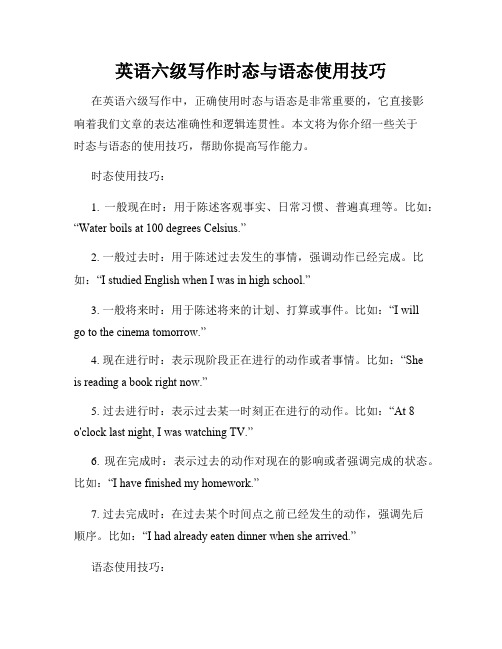
英语六级写作时态与语态使用技巧在英语六级写作中,正确使用时态与语态是非常重要的,它直接影响着我们文章的表达准确性和逻辑连贯性。
本文将为你介绍一些关于时态与语态的使用技巧,帮助你提高写作能力。
时态使用技巧:1. 一般现在时:用于陈述客观事实、日常习惯、普遍真理等。
比如:“Water boils at 100 degrees Celsius.”2. 一般过去时:用于陈述过去发生的事情,强调动作已经完成。
比如:“I studied English when I was in high school.”3. 一般将来时:用于陈述将来的计划、打算或事件。
比如:“I willgo to the cinema tomorrow.”4. 现在进行时:表示现阶段正在进行的动作或者事情。
比如:“Sheis reading a book right now.”5. 过去进行时:表示过去某一时刻正在进行的动作。
比如:“At 8o'clock last night, I was watching TV.”6. 现在完成时:表示过去的动作对现在的影响或者强调完成的状态。
比如:“I have finished my homework.”7. 过去完成时:在过去某个时间点之前已经发生的动作,强调先后顺序。
比如:“I had already eaten dinner when she arrived.”语态使用技巧:1. 主动语态:强调主语是动作的执行者,常用于陈述事实和评论观点。
比如:“He wrote a novel last year.”2. 被动语态:强调动作的接受者,常用于无法确认或者不重要的对象。
比如:“The book was written by him.”3. 使役语态:表示主语引起或者使对方进行某种动作。
比如:“I had my car repaired yesterday.”4. 双宾语语态:句子的宾语由两个,常见的结构是“give/ send/ offer/ show/ tell/ teach + 宾语 + 间接宾语”,表示主动与被动的关系。
英语六级语法复习要点
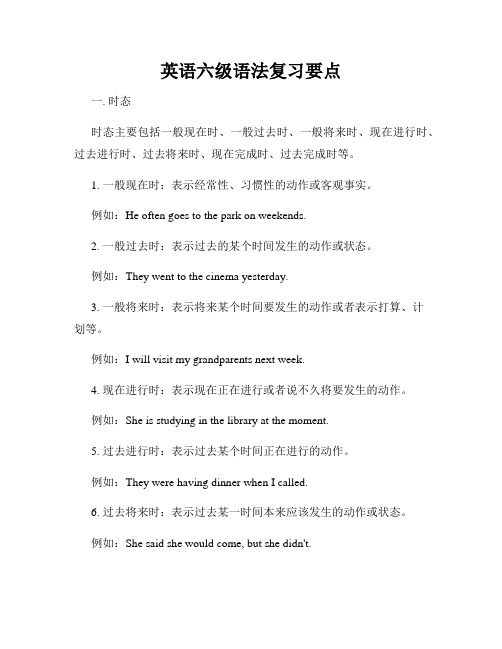
英语六级语法复习要点一. 时态时态主要包括一般现在时、一般过去时、一般将来时、现在进行时、过去进行时、过去将来时、现在完成时、过去完成时等。
1. 一般现在时:表示经常性、习惯性的动作或客观事实。
例如:He often goes to the park on weekends.2. 一般过去时:表示过去的某个时间发生的动作或状态。
例如:They went to the cinema yesterday.3. 一般将来时:表示将来某个时间要发生的动作或者表示打算、计划等。
例如:I will visit my grandparents next week.4. 现在进行时:表示现在正在进行或者说不久将要发生的动作。
例如:She is studying in the library at the moment.5. 过去进行时:表示过去某个时间正在进行的动作。
例如:They were having dinner when I called.6. 过去将来时:表示过去某一时间本来应该发生的动作或状态。
例如:She said she would come, but she didn't.7. 现在完成时:表示过去某一个时间发生的动作对现在产生的影响或结果。
例如:I have finished my homework.8. 过去完成时:表示过去的过去某个时间点或某个动作之前已经发生的动作或状态。
例如:She had already left when we arrived.二. 语态语态主要包括主动语态和被动语态。
1. 主动语态:表示主语是动作的执行者。
例如:We clean the house every week.2. 被动语态:表示主语是动作的承受者。
例如:The book was written by him.三. 并列连词并列连词用于连接同等重要的词、短语、句子或句段。
1. and:表示并列关系,相当于“和”。
英语六级的常见语法知识点梳理与总结
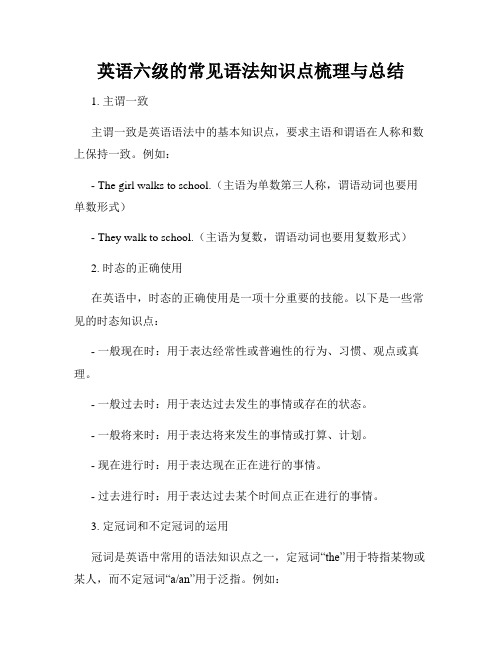
英语六级的常见语法知识点梳理与总结1. 主谓一致主谓一致是英语语法中的基本知识点,要求主语和谓语在人称和数上保持一致。
例如:- The girl walks to school.(主语为单数第三人称,谓语动词也要用单数形式)- They walk to school.(主语为复数,谓语动词也要用复数形式)2. 时态的正确使用在英语中,时态的正确使用是一项十分重要的技能。
以下是一些常见的时态知识点:- 一般现在时:用于表达经常性或普遍性的行为、习惯、观点或真理。
- 一般过去时:用于表达过去发生的事情或存在的状态。
- 一般将来时:用于表达将来发生的事情或打算、计划。
- 现在进行时:用于表达现在正在进行的事情。
- 过去进行时:用于表达过去某个时间点正在进行的事情。
3. 定冠词和不定冠词的运用冠词是英语中常用的语法知识点之一,定冠词“the”用于特指某物或某人,而不定冠词“a/an”用于泛指。
例如:- The book on the table is mine.(特指)- A book is on the table.(泛指)4. 形容词和副词的区别形容词用于修饰名词,描述事物的性质或特征,而副词用于修饰动词、形容词或其他副词,描述动作或状态的方式。
例如:- She is a beautiful girl.(形容词修饰名词)- She sings beautifully.(副词修饰动词)5. 直接引语和间接引语的变换直接引语是指直接引用别人的原话,而间接引语是将别人的话改写成自己的话。
在变换时,需要注意时态、人称和地点等因素的变化。
例如:- He said, "I am happy."(直接引语)- He said that he was happy.(间接引语)6. 并列连词的运用并列连词用于连接并列的词、短语或句子。
常见的并列连词有and、but、or等。
例如:- I like apples and oranges.(连接并列的两个名词)- She is tired but happy.(连接并列的两个形容词)7. 从句的使用从句是一个句子的一部分,由引导词引导,在句中充当名词、形容词或副词的作用。
英语六级语法常见考点归纳
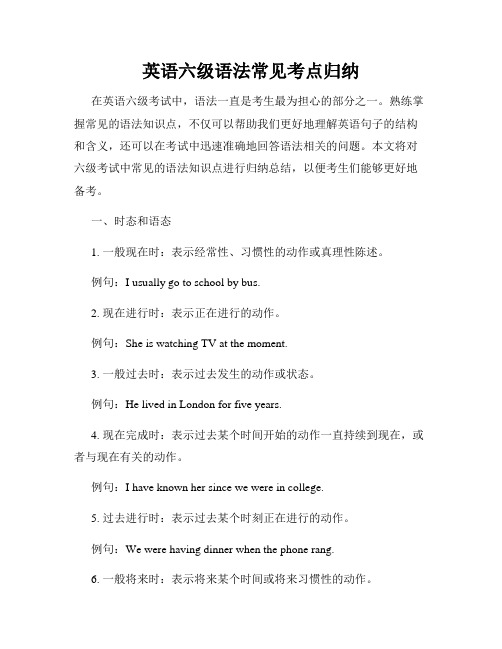
英语六级语法常见考点归纳在英语六级考试中,语法一直是考生最为担心的部分之一。
熟练掌握常见的语法知识点,不仅可以帮助我们更好地理解英语句子的结构和含义,还可以在考试中迅速准确地回答语法相关的问题。
本文将对六级考试中常见的语法知识点进行归纳总结,以便考生们能够更好地备考。
一、时态和语态1. 一般现在时:表示经常性、习惯性的动作或真理性陈述。
例句:I usually go to school by bus.2. 现在进行时:表示正在进行的动作。
例句:She is watching TV at the moment.3. 一般过去时:表示过去发生的动作或状态。
例句:He lived in London for five years.4. 现在完成时:表示过去某个时间开始的动作一直持续到现在,或者与现在有关的动作。
例句:I have known her since we were in college.5. 过去进行时:表示过去某个时刻正在进行的动作。
例句:We were having dinner when the phone rang.6. 一般将来时:表示将来某个时间或将来习惯性的动作。
例句:They will come to visit us next week.7. 被动语态:表示动作的承受者,强调动作的发出者。
例句:The book was written by Mark Twain.二、条件句1. 条件句类型一:表示对未来可能发生的事情进行设想或推测。
例句:If it rains tomorrow, we will stay at home.2. 条件句类型二:表示虚拟的条件,与事实相反。
例句:If I were you, I would study harder.3. 条件句类型三:表示过去的不可能发生的情况。
例句:If I had known about the plan, I would have joined.三、虚拟语气1. 虚拟语气用于表达非现实或假设的情况,通常包括以下几种情况:- 表示建议、要求、命令:I suggest that he (should) come early.- 表示愿望、要求、建议:I wish I were taller.- 表示假设的情况:If I were you, I would go.四、从句连接词1. 名词性从句:作为主语、宾语或表语,连接词有that, whether, what等。
四六级语法知识点详解

四六级语法知识点详解英语四六级考试是大学英语水平考试的一种,对于很多学生来说,语法是其中一个比较难以掌握的部分。
本文将详细解释四六级考试中常见的语法知识点,帮助学生更好地应对考试。
一、时态和语态1. Simple Present Tense(简单现在时)简单现在时表示经常或习惯性发生的动作、真理、客观存在的事实等。
结构:主语 + 动词原形(第三人称单数在动词后加s或es)例句:I eat breakfast every morning.(我每天早上吃早餐)2. Present Continuous Tense(现在进行时)现在进行时表示现在正在进行的动作。
结构:主语 + am/is/are + 动词ing形式例句:She is studying in the library now.(她正在图书馆学习)3. Simple Past Tense(简单过去时)简单过去时表示过去某个时间发生的动作或存在的状态。
结构:主语 + 动词过去式例句:They visited their grandparents last weekend.(他们上周末去看望了他们的祖父母)4. Past Continuous Tense(过去进行时)过去进行时表示过去某个时间正在进行的动作。
结构:主语 + was/were + 动词ing形式例句:I was watching TV when she called me.(她打电话给我时,我正在看电视)5. Simple Future Tense(简单将来时)简单将来时表示将来要发生的动作或存在的状态。
结构:主语 + will + 动词原形例句:We will have a party next week.(我们下周要开个派对)6. Future Continuous Tense(将来进行时)将来进行时表示将来某个时间正在进行的动作。
结构:主语 + will be + 动词ing形式例句:I will be sleeping when you arrive.(当你到达时,我将正在睡觉)7. Passive Voice(被动语态)被动语态用于强调动作的承受者而不是施动者。
英语六级中的语法重点
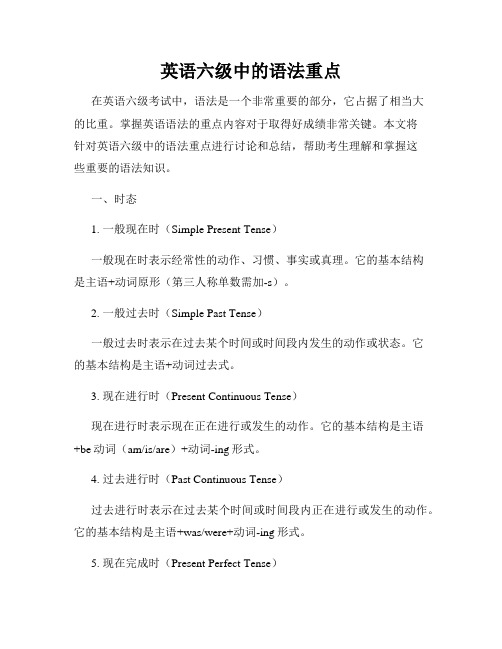
英语六级中的语法重点在英语六级考试中,语法是一个非常重要的部分,它占据了相当大的比重。
掌握英语语法的重点内容对于取得好成绩非常关键。
本文将针对英语六级中的语法重点进行讨论和总结,帮助考生理解和掌握这些重要的语法知识。
一、时态1. 一般现在时(Simple Present Tense)一般现在时表示经常性的动作、习惯、事实或真理。
它的基本结构是主语+动词原形(第三人称单数需加-s)。
2. 一般过去时(Simple Past Tense)一般过去时表示在过去某个时间或时间段内发生的动作或状态。
它的基本结构是主语+动词过去式。
3. 现在进行时(Present Continuous Tense)现在进行时表示现在正在进行或发生的动作。
它的基本结构是主语+be动词(am/is/are)+动词-ing形式。
4. 过去进行时(Past Continuous Tense)过去进行时表示在过去某个时间或时间段内正在进行或发生的动作。
它的基本结构是主语+was/were+动词-ing形式。
5. 现在完成时(Present Perfect Tense)现在完成时表示过去发生的动作对现在造成的影响或结果。
它的基本结构是主语+have/has+动词过去分词。
6. 过去完成时(Past Perfect Tense)过去完成时表示在过去某个时间或时间段之前已经发生的动作。
它的基本结构是主语+had+动词过去分词。
7. 将来时(Future Tense)将来时表示将要发生的动作或存在的状态。
根据具体情境的不同,将来时可以分为一般将来时、将来进行时和将来完成时。
二、被动语态被动语态用于强调动作的承受者,而不是执行者。
被动语态的基本结构是be动词+动词过去分词。
在各种时态中,被动语态都可以使用。
三、虚拟语气虚拟语气用于表示与事实相反的假设情况。
在英语六级考试中,主要有三种虚拟语气的用法:与现在事实相反的虚拟语气、与过去事实相反的虚拟语气和与将来事实相反的虚拟语气。
掌握四六级的常见语法知识

掌握四六级的常见语法知识英语四六级考试是中国国家级考试中最重要的英语能力测试之一。
在考试中,语法知识是考察的重点之一,掌握常见的语法知识对于取得好成绩至关重要。
本文将介绍一些四六级考试中常见的语法知识点,希望能够帮助大家更好地应对考试。
一、时态1. 一般现在时一般现在时表示经常性的、普遍性的动作或状态。
常用的时间状语有always、usually、often等。
例如:He always goes to bed early.2. 现在进行时现在进行时表示现在正在进行的动作,常与now、at the moment等时间状语连用。
例如:She is reading a book now.3. 一般过去时一般过去时表示过去某个时间发生的动作或状态。
常用的时间状语有yesterday、last week等。
例如:I watched a movie last night.4. 过去进行时过去进行时表示过去某个时间正在进行的动作。
例如:He was studying when I called him.5. 一般将来时一般将来时表示将来某个时间要发生的动作。
常用的时间状语有tomorrow、next week等。
例如:I will visit my grandparents next month.二、被动语态1. 一般现在时的被动语态一般现在时的被动语态结构为be+过去分词。
常用于没有明确表示动作执行者的句子。
例如:The book is written by a famous author.2. 一般过去时的被动语态一般过去时的被动语态结构为was/were+过去分词。
表示过去某个时间发生的被动动作。
例如:The letter was sent yesterday.3. 一般将来时的被动语态一般将来时的被动语态结构为will be+过去分词。
表示将来某个时间会发生的被动动作。
例如:The cake will be eaten at the party.三、虚拟语气1. 虚拟语气的主要用法虚拟语气用于表示非真实的情况、假设、建议等。
英语六级中的语法重点及易错点
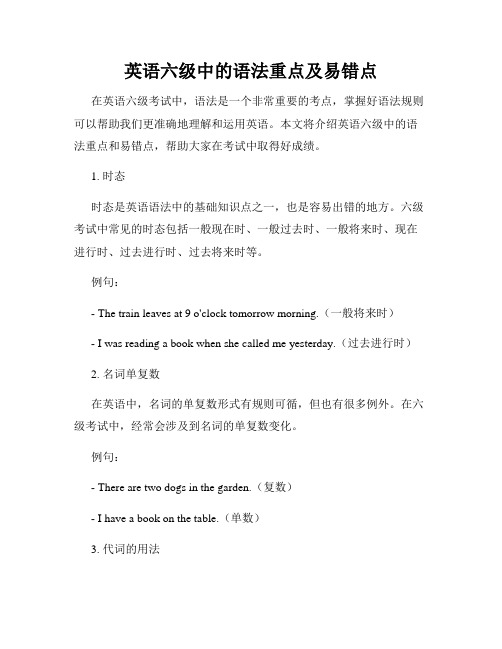
英语六级中的语法重点及易错点在英语六级考试中,语法是一个非常重要的考点,掌握好语法规则可以帮助我们更准确地理解和运用英语。
本文将介绍英语六级中的语法重点和易错点,帮助大家在考试中取得好成绩。
1. 时态时态是英语语法中的基础知识点之一,也是容易出错的地方。
六级考试中常见的时态包括一般现在时、一般过去时、一般将来时、现在进行时、过去进行时、过去将来时等。
例句:- The train leaves at 9 o'clock tomorrow morning.(一般将来时)- I was reading a book when she called me yesterday.(过去进行时)2. 名词单复数在英语中,名词的单复数形式有规则可循,但也有很多例外。
在六级考试中,经常会涉及到名词的单复数变化。
例句:- There are two dogs in the garden.(复数)- I have a book on the table.(单数)3. 代词的用法代词是指用来代替名词的词语,包括人称代词、物主代词、指示代词、相互代词等。
在使用代词时,要注意其与被代替的名词在性、数、格等方面的一致性。
例句:- She is a teacher. She loves her job.(人称代词)- This is my book, not yours.(物主代词)4. 介词的搭配介词在句子中起着连接作用,用来表示时间、地点、原因、方式等。
在六级考试中,常常出现关于介词的选择或搭配错误的题目。
例句:- He is good at playing the piano.(搭配:be good at)- The party will start at 7 o'clock in the evening.(搭配:at+具体时间)5. 从句的使用从句是句子中的一个组成部分,常包括主语从句、宾语从句、定语从句、状语从句等类型。
英语六级语法知识点总结与应用练习题与语法复习重点与易错知识点
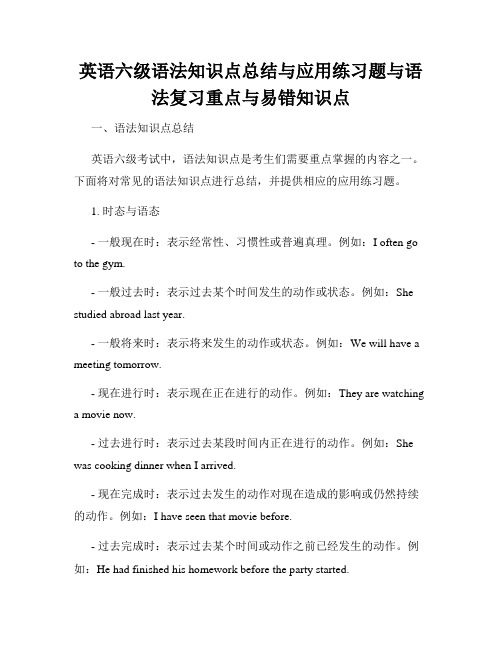
英语六级语法知识点总结与应用练习题与语法复习重点与易错知识点一、语法知识点总结英语六级考试中,语法知识点是考生们需要重点掌握的内容之一。
下面将对常见的语法知识点进行总结,并提供相应的应用练习题。
1. 时态与语态- 一般现在时:表示经常性、习惯性或普遍真理。
例如:I often go to the gym.- 一般过去时:表示过去某个时间发生的动作或状态。
例如:She studied abroad last year.- 一般将来时:表示将来发生的动作或状态。
例如:We will have a meeting tomorrow.- 现在进行时:表示现在正在进行的动作。
例如:They are watching a movie now.- 过去进行时:表示过去某段时间内正在进行的动作。
例如:She was cooking dinner when I arrived.- 现在完成时:表示过去发生的动作对现在造成的影响或仍然持续的动作。
例如:I have seen that movie before.- 过去完成时:表示过去某个时间或动作之前已经发生的动作。
例如:He had finished his homework before the party started.- 被动语态:表示句子的主语是动作的承受者。
例如:The book was written by Mark Twain.练习题:1. The train _____ at 9:00 a.m. yesterday. (arrive)2. How long _____ each other before they got married? (know)3. The project _____ by the team next week. (complete)4. They _____ their English skills for the upcoming exam. (improve)5. The house _____ when we visited last week. (paint)2. 名词- 可数名词与不可数名词:可数名词可以用于单数和复数形式,而不可数名词只能用于单数形式。
英语六级语法讲解

英语六级语法讲解英语六级语法时态部分英语中最常见以及常考的时态是一般现在时、一般过去时、一般将来时、现在完成时、现在进行时等八种。
这些时态我们几乎在每次使用英语的时候,无论是说话或者是写作,都会遇到,一般用法早已熟记于心了,复习的时候只要留心他们的一些特殊用法,这里以现在完成时和现在(完成)进行时为例。
现在完成时的一些特殊用法:1、在this is(it is)the first time that…句型中,从句常用完成时态。
如:It is the seco nd time he has been out with her。
2、have been to与have gone to的区别。
前者侧重表示经历过,说话人可能已经不在那个地方,或者已经回来了。
而后者表示已经去了那里,说话的时候可能还在那里,或者在去那里的路上。
3、用在时间或条件状语从句中,表示将来某个动作发生之前业已完成的动作,如:I’ll go to see the film as soon as I have finished my homework。
我一做完作业就去看电影。
其中做完作业的动作在看电影动作之前完成。
4、when引起的疑问句中一般不用现在完成时,因为询问者关心的是事情发生的具体时间现在(完成)进行时除了表示正在进行的动作之外,主要还有以下的用法:与频度副词如always,continually,constantlyforever等状语连用,表示经常发生的,具有持续性动作的事情,或者表示不满,或者心中抱怨。
如he is always thinking英语六级语法主谓一致在英语中,最重要的一致关系就是主谓一致了,一般来说单数主语用单数动词,复数主语用复数动词。
但是主语有时候并不仅仅是简单的单数或者复数。
比如说集合名词就既能当数主语又可以作复数主语。
另外如不定代词、不定式,以及从句等都能作主语,它们的单复数就不那么容易划分了,这样使用单复数动词的相应具体规则也比较多,但是这些规则基本上都离不开三个大的原则。
英语六级语法复习重点梳理
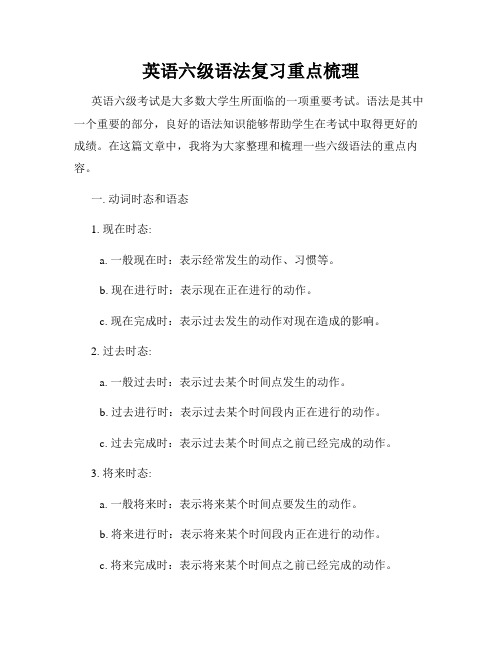
英语六级语法复习重点梳理英语六级考试是大多数大学生所面临的一项重要考试。
语法是其中一个重要的部分,良好的语法知识能够帮助学生在考试中取得更好的成绩。
在这篇文章中,我将为大家整理和梳理一些六级语法的重点内容。
一. 动词时态和语态1. 现在时态:a. 一般现在时:表示经常发生的动作、习惯等。
b. 现在进行时:表示现在正在进行的动作。
c. 现在完成时:表示过去发生的动作对现在造成的影响。
2. 过去时态:a. 一般过去时:表示过去某个时间点发生的动作。
b. 过去进行时:表示过去某个时间段内正在进行的动作。
c. 过去完成时:表示过去某个时间点之前已经完成的动作。
3. 将来时态:a. 一般将来时:表示将来某个时间点要发生的动作。
b. 将来进行时:表示将来某个时间段内正在进行的动作。
c. 将来完成时:表示将来某个时间点之前已经完成的动作。
4. 语态:a. 主动语态:表示主语是动作的执行者。
b. 被动语态:表示主语是动作的承受者。
二. 名词1. 可数名词与不可数名词:a. 可数名词:可以单复数形式存在的名词。
b. 不可数名词:只能以单数形式存在的名词。
2. 名词所有格:a. 一般情况下,名词所有格由名词后面加上的"’s"构成。
b. 若名词已经以"s"结尾,则只需在名词后加上"’"。
三. 代词1. 主格代词和宾格代词:a. 主格代词用于作主语,宾格代词用于作宾语。
b. 主格代词包括:I, you, he, she, it, we, they。
c. 宾格代词包括:me, you, him, her, it, us, them。
2. 反身代词:a. 反身代词用于表示主语和宾语一致的情况。
b. 反身代词包括:myself, yourself, himself, herself, itself, ourselves, themselves。
四. 形容词和副词1. 形容词的基本用法:a. 形容词用于修饰名词,表示名词的性质或特征。
英语六级语法常考点整理
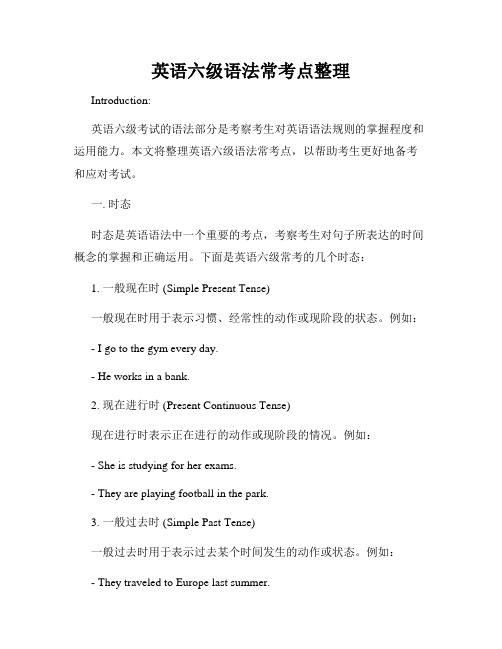
英语六级语法常考点整理Introduction:英语六级考试的语法部分是考察考生对英语语法规则的掌握程度和运用能力。
本文将整理英语六级语法常考点,以帮助考生更好地备考和应对考试。
一. 时态时态是英语语法中一个重要的考点,考察考生对句子所表达的时间概念的掌握和正确运用。
下面是英语六级常考的几个时态:1. 一般现在时 (Simple Present Tense)一般现在时用于表示习惯、经常性的动作或现阶段的状态。
例如:- I go to the gym every day.- He works in a bank.2. 现在进行时 (Present Continuous Tense)现在进行时表示正在进行的动作或现阶段的情况。
例如:- She is studying for her exams.- They are playing football in the park.3. 一般过去时 (Simple Past Tense)一般过去时用于表示过去某个时间发生的动作或状态。
例如:- They traveled to Europe last summer.- I lived in New York for two years.4. 过去进行时 (Past Continuous Tense)过去进行时表示过去某一时间段内正在进行的动作。
例如:- She was watching TV when I called her.- I was studying all night for the exam.5. 现在完成时 (Present Perfect Tense)现在完成时用于表示过去的动作对现在产生的影响或结果。
例如:- I have finished my homework.- They have been to Paris twice.二. 语态语态是英语中表示动作主体与动作对象之间关系的一种句子结构。
英语六级语法常考知识点
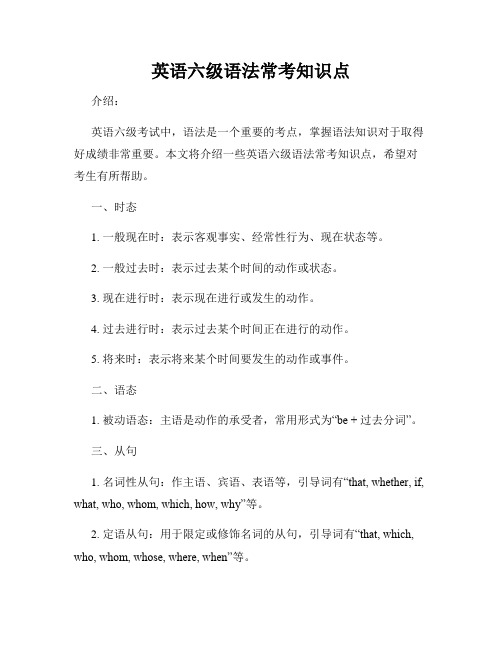
英语六级语法常考知识点介绍:英语六级考试中,语法是一个重要的考点,掌握语法知识对于取得好成绩非常重要。
本文将介绍一些英语六级语法常考知识点,希望对考生有所帮助。
一、时态1. 一般现在时:表示客观事实、经常性行为、现在状态等。
2. 一般过去时:表示过去某个时间的动作或状态。
3. 现在进行时:表示现在进行或发生的动作。
4. 过去进行时:表示过去某个时间正在进行的动作。
5. 将来时:表示将来某个时间要发生的动作或事件。
二、语态1. 被动语态:主语是动作的承受者,常用形式为“be + 过去分词”。
三、从句1. 名词性从句:作主语、宾语、表语等,引导词有“that, whether, if, what, who, whom, which, how, why”等。
2. 定语从句:用于限定或修饰名词的从句,引导词有“that, which, who, whom, whose, where, when”等。
3. 状语从句:用于表示条件、原因、目的、结果、时间等从句,引导词有“if, unless, because, as, so that, although, when, while”等。
四、主谓一致1. 单数主语,单数谓语动词;复数主语,复数谓语动词。
2. 连接词“and”连接两个或多个主语时,谓语动词用复数形式。
五、倒装1. 完全倒装:将助动词、情态动词或一些表示方向、地点的副词放在句首,然后是主语,再是动词。
2. 部分倒装:将助动词、情态动词放在主语之前,谓语动词放在主语之后。
六、固定句型1. 强调句型:It is/was + 被强调部分 + that/who + 其余部分。
2. 虚拟语气句型:If引导的虚拟条件句中,谓语动词用过去式或过去完成式;主句中,谓语动词用"would + 动词原形"。
七、冠词1. 不定冠词“a/an”:表示泛指一个人或物。
2. 定冠词“the”:特指某一个人或物,或已提及的人或物。
英语六级语法重点归纳整理
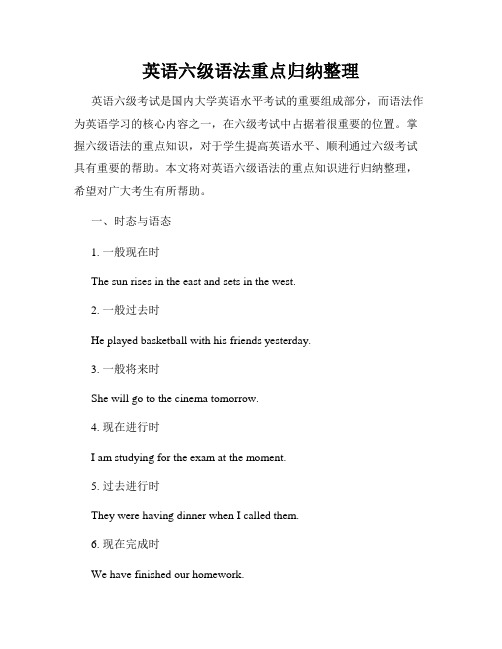
英语六级语法重点归纳整理英语六级考试是国内大学英语水平考试的重要组成部分,而语法作为英语学习的核心内容之一,在六级考试中占据着很重要的位置。
掌握六级语法的重点知识,对于学生提高英语水平、顺利通过六级考试具有重要的帮助。
本文将对英语六级语法的重点知识进行归纳整理,希望对广大考生有所帮助。
一、时态与语态1. 一般现在时The sun rises in the east and sets in the west.2. 一般过去时He played basketball with his friends yesterday.3. 一般将来时She will go to the cinema tomorrow.4. 现在进行时I am studying for the exam at the moment.5. 过去进行时They were having dinner when I called them.6. 现在完成时We have finished our homework.7. 过去完成时She had already left when I arrived.8. 过去将来时He said he would come to the party next week.9. 被动语态The book was written by a famous author.二、名词1. 可数名词与不可数名词I have two cats. (可数名词)There is some water in the bottle. (不可数名词)2. 可数名词的单复数形式I have two apples. She has three pens.3. 特殊名词的复数形式I have two children. They are playing in the park.4. 物主代词的用法This is my book. That is yours.5. 名词所有格的用法John's car is parked over there.三、代词1. 主格代词与宾格代词He likes her. (主格代词)She is taller than him. (宾格代词)2. 反身代词She hurt herself while playing football. 3. 物主代词This is mine. That is yours.四、形容词与副词1. 形容词的用法She is a beautiful girl.2. 副词的用法He swims fast.3. 比较级与最高级This book is more interesting than that one. She is the tallest girl in our class.五、动词1. 动词的时态变化I go to school every day. (一般现在时)He is playing basketball now. (现在进行时) 2. 动词的情态动词She can speak French.3. 动词的被动语态The letter was written by her.4. 动词的不定式I want to learn how to play the guitar.六、介词1. 表示位置的介词The book is on the table.2. 表示时间的介词She will arrive at the airport at 5 o'clock. 3. 表示方式的介词He won the game with great effort.七、连词1. 并列连词I like playing basketball and swimming.2. 从属连词I will stay at home if it rains tomorrow.3. 连接副词He is neither tall nor short.以上是英语六级语法的重点知识进行的归纳整理,希望对广大考生有所帮助。
英语六级语法重点整理
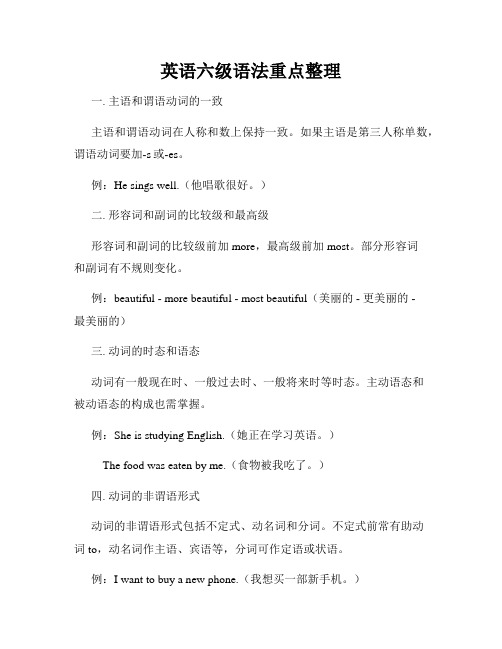
英语六级语法重点整理一. 主语和谓语动词的一致主语和谓语动词在人称和数上保持一致。
如果主语是第三人称单数,谓语动词要加-s或-es。
例:He sings well.(他唱歌很好。
)二. 形容词和副词的比较级和最高级形容词和副词的比较级前加more,最高级前加most。
部分形容词和副词有不规则变化。
例:beautiful - more beautiful - most beautiful(美丽的 - 更美丽的 -最美丽的)三. 动词的时态和语态动词有一般现在时、一般过去时、一般将来时等时态。
主动语态和被动语态的构成也需掌握。
例:She is studying English.(她正在学习英语。
)The food was eaten by me.(食物被我吃了。
)四. 动词的非谓语形式动词的非谓语形式包括不定式、动名词和分词。
不定式前常有助动词to,动名词作主语、宾语等,分词可作定语或状语。
例:I want to buy a new phone.(我想买一部新手机。
)Running is good for your health.(跑步对你的健康有好处。
)五. 名词的单复数和所有格普通名词的复数有加-s或-es等形式,不规则变化的名词需记住。
名词所有格用's或'形式表示。
例:I have two cats.(我有两只猫。
)John's book is on the table.(约翰的书在桌子上。
)六. 代词的用法代词分人称代词、指示代词、疑问代词、不定代词等。
需掌握各类代词的用法和形式。
例:He is my friend.(他是我的朋友。
)What is your name?(你叫什么名字?)七. 冠词的用法冠词包括不定冠词a/an和定冠词the。
不定冠词用于泛指,定冠词用于特指。
例:I want an apple.(我想要一个苹果。
)The dog is barking.(那条狗在叫。
2021年12月大学英语六级基础语法知识:一般现在时表将来

2021年12月大学英语六级基础语法知识汇总
英语六级语法巩固:一般现在时表将来
1)下列动词:come, go, arrive, leave, start, begin, return的一般现在时表将来。
这主要用来表示在时间上已确定或安排好的事情。
The train leaves at six tomorrow morning.
When does the bus star It stars in ten minutes.
2)倒装句,表示动作正在进行,如:
Here comes the bus.=The bus is coming.
There goes the bell.=The bell is ringing.
3)在时间或条件句中。
When Bill comes (不是will come), ask him to wait for me.
I‘ll write to you as soon as I arrive there.
4)在动词hope, take care that, make sure that等后。
I hope they have a nice time next week.
Make sure that the windows are closed before you leave the room.
2021年12月大学英语六级基础语法知识汇总
1。
- 1、下载文档前请自行甄别文档内容的完整性,平台不提供额外的编辑、内容补充、找答案等附加服务。
- 2、"仅部分预览"的文档,不可在线预览部分如存在完整性等问题,可反馈申请退款(可完整预览的文档不适用该条件!)。
- 3、如文档侵犯您的权益,请联系客服反馈,我们会尽快为您处理(人工客服工作时间:9:00-18:30)。
大学英语六级语法基础:
一般现在时,过去时,过去完成时,现在完成时1.一般现在时
(1)表示经常性、习惯性的动作;
eg:I get up at 7 o' clock in the morning.
I leave school for home at 6 every evening.
(2)客观真理,客观存在,科学事实;
eg:The teacher told us: the earth moves around the sun. Shanghai lies in the east of China.
2.一般过去时
两种变化形式:在动词后加ed或不规则变化的动词;
在确定的过去时间里所发生的动作或存在的状态:
常用时间状语有:yesterday, last week, an hour ago, the other day, in 1982等;
eg:Did you go to Shanghai last week?
补充:used to/be used to
(1)used to + do:"过去常常",表示过去习惯性的动作或状态,但如今已不存在;
eg:Mike used to take a walk.
(2)be used to + doing:对……已感到习惯,或"习惯于",to是介词,后需加名词或动名词;
eg:Mike is used to taking a walk.
He is used to taking a shower with cold water.
(3)be used to do:被用来做……
eg:Leaves are used to fight enemies in Kong fu movies as the weapons.
典型例题
---- Your phone number again? I ___ quite catch it.
---- It's 69568442.
A. didn't
B. couldn't
C. don't
D. can't
答案A. 本句虽没有明确的时间状语,但从语意上看出,在听的时候没有听懂这
个动作发生在过去,因此应用过去时。
2.一般过去式和过去完成时的对比:
(1)过去完成时:
过去的过去;
eg:Before I came to Beijing, I had stayed in Shanghai.
① 一个句子里有两个谓语动词,一个发生在前,一个发生在后,发生在前的用
一般过去时,发生在后的用过去完成时;
eg:When the police arrived, the thieves had run away.
② 表示意向的动词,如hope, wish, expect, think, intend, mean, suppose
等,用过去完成时表示"原本…,却未能…"
eg:We had hoped that you would come, but you didn't. We had
thought that he would take part in the competition,but he didn't.
③ 虚拟语气:
若虚拟的现象与过去事实相反,则用过去完成时;
eg:If you had come to my birthday party, you would have seen Yaoming. 虚拟语气中可以用had+过去分词,表示对过去事实的虚拟;
3. 一般将来时
(1)shall/will, shall用于第一人称,常被will 所代替;
eg:Which paragraph shall I read first?
(2)be going to +不定式,表示将来;表示要发生的事情有了预先的计划、准
备或有迹象表明要发生;
eg:What are you going to do tomorrow?
What will you do this afternoon?
will表示纯粹的将来;
(3)be +不定式:表将来,按计划或正式安排将发生的事;
eg:We are to/will discuss the report next Saturday.
(4)be about to +不定式:意为马上做某事,后面不可以接时间状语;
eg:He is about to leave for Beijing.
注意:
(1)一般现在时有时也可表将来;
eg:The train leaves at six tomorrow morning.
① 趋向性动词come, go, arrive, leave, start, begin, return的一般现在时表将来,主要用来表示在时间上已确定或安排好的事情。
eg:When does the bus star? It stars in ten minutes.
② 在时间或条件句中,用一般现在时表将来;
eg:I'll write to you as soon as I arrive in Beijing.
(2)现在进行时也可表将来:通常用于口语,翻译为打算……;
come, go, start, arrive, leave, stay等词可以用进行时表将来;
3.现在完成时
现在完成时用来表示之前已发生或完成的动作或状态,其结果对现在造成影响。
(1)过去发生的动作发生到现在,刚刚完成;
(2)从过去发生的动作,发生到现在,刚刚告一段落,但是后面会继续发生;eg:I have just finished my homework.
It has rained for 3 days.
过去时与现在完成时的区别:
(1)过去时表示过去某时发生的动作或单纯叙述过去的事情,强调动作;现在
完成时为过去发生的,强调过去的事情对现在的影响,强调的是影响。
eg:I came to Beijing in 1995.
I have stayed in Beijing since 1995.
(2)过去时常与具体的时间状语连用,而现在完成时通常与段的时间状语连用,或无时间状语;一般过去时常用时间状语:yesterday, last week,…ago, in1980, in October…(具体时间)
现在完成时常用时间状语:for, since, so far…(长期的段时间)
eg:He had dinner with me yesterday.
I have played basketball for 3 hours.
(3)现在完成时可表示持续到现在的动作或状态,动词一般是延续性的,如live, teach, learn, work, study, know;过去时常用的非持续性动词有come, go, leave, start, die, finish, become, get married等;
eg:He got married two years ago.
I have lived in Beijing for 10 years.
用于现在完成时的句型
(1)It is the first / second time…. that…结构中的从句部分,用现在完成时。
It is the first time that I have visited the city.
It was the third time that the boy had been late.
(2)This is the… that…结构,that 从句要用现在完成时.
This is the best film that I've (ever) seen.
这是我看过的最好的电影。
This is the first time (that) I've heard him sing. 这是我第一次听他唱歌。
典型例题
---Have you ____ been to our town before?
---No, it's the first time I ___ here.
A. even, come
B. even, have come
C. ever, come
D. ever, have come 答案D. ever意为曾经或无论何时,反意词为never,此两词常用于完成时。
This is the largest fish I have ever seen. It is / was the first time +that-clause 的句型中,从句要用完成时。
